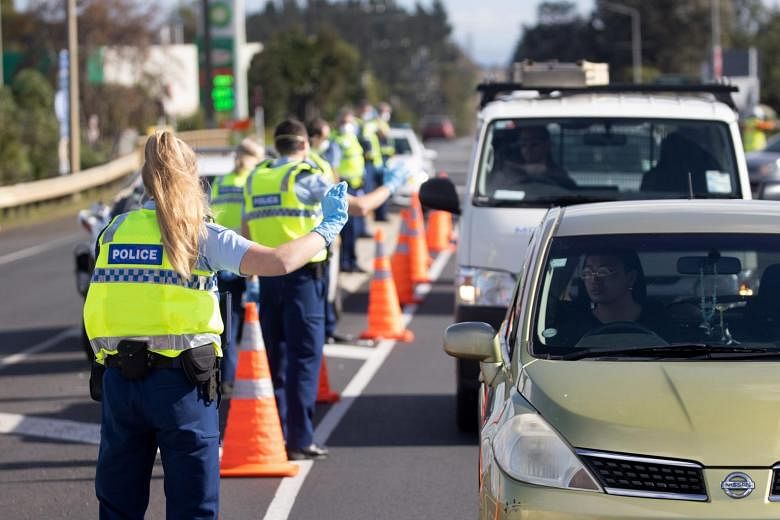WELLINGTON (REUTERS) - New Zealand officials are scrambling to trace the source of an outbreak of the coronavirus, reporting 13 new cases on Thursday (Aug 13), after Prime Minister Jacinda Ardern had sought to eradicate the virus with a hard lockdown.
The resurgence of Covid-19 comes just weeks before a scheduled general election, increasing pressure on Ms Ardern to get the outbreak under control amid growing criticism.
The Prime Minister swiftly reimposed tight movement restrictions in Auckland and social distancing measures across the rest of the country after the discovery this week of four infected family members in the city.
"Once again, we are reminded of how tricky this virus is and how easily it can spread," she said. "Going hard and early is still the best course of action."
New Zealand announced on Thursday that there were 13 new cases in the community, and one overseas arrival who was in quarantine, bringing the total number of active cases to 36.
Ms Ardern said it was a positive sign that all the new 13 cases were linked back to the infected family, either via work or broader family connections. All were being transferred into quarantine facilities.
She said that experience showed "things will get worse before they get better", and more cases were likely to be reported in coming days.
Deputy Prime Minister Winston Peters said that he suspected the cause of the outbreak came from quarantine, and that confirmation should come soon.
"I think there's been a breach inside our quarantine system, and I think, when that comes out very shortly, in a matter of maybe less than a day, we'll find out that was the case," Mr Peters told the Australian Broadcasting Corporation.
Mr Peters said he had been informed of the details by a New Zealand journalist.
Director-General of Health Ashley Bloomfield said health officials were getting "closer every hour" to finding the patient zero of the outbreak.
"We are working flat out to do the contact-tracing we need to do and trace back to find out what the source of this infection is," Dr Bloomfield told Newstalk ZB radio.
Dr Bloomfield raised the possibility on Wednesday that the virus had arrived in New Zealand via freight, given one of the infected family members works in a cool store that takes imported frozen goods from overseas.
Ten of the new cases were either cool store staff or their family members. The cool store is operated by the New Zealand unit of US-based Americold Realty Trust.
On Thursday, Dr Bloomfield said that importing the virus via freight was considered "a low possibility" as the infection source, but officials wanted to formally rule it out.
China has reported the virus on frozen food packaged in South America.
Some prominent local health experts suggested it was more likely the virus had been quietly spreading in Auckland for weeks, infecting potentially dozens of people.
This possibility has allowed the major opposition National Party to seize on potential flaws in Ms Ardern's approach ahead of the Sept 19 election, which she described as a "Covid election" when launching her campaign.
Ms Ardern is on track to easily win the election, according to recent polls, but the National Party is pressuring her to delay the vote until at least November, arguing their inability to campaign gives the Prime Minister an unfair advantage.
Ms Ardern said she will announce a decision on the election date after she reveals on Friday whether lockdown measures will be extended.
The election must be held by Nov 21.
Critics are also highlighting the economic impact of an extended shutdown.
Reserve Bank of New Zealand Deputy Governor Geoff Bascand told Reuters the resurgence posed "a major risk" to the bank's outlook, given its baseline scenario has an assumption that the virus is contained in the country.
In Auckland, home to around 1.7 million people, were given just hours to prepare for the return to level 3 restrictions on Wednesday, requiring people to stay at home, except for essential trips.
Police set up checkpoints at the city's borders as scores of people attempted to leave to avoid a sustained lockdown, as Ms Ardern warned they would be turned back.
Long queues of people formed at pop-up clinics, with some waiting hours to be tested for the virus, and there was a rush to supermarkets to stock up on essentials.
There was also growing anger at revelations that members of the infected family had visited several tourist sites in the town of Rotorua and an aged care home in the Waikato district, both south of Auckland.
"We can see the seriousness of the situation we are in," Ms Ardern said. "It's being dealt with in an urgent but calm and methodical way."
With 1,238 confirmed cases and 22 deaths, New Zealand's exposure to the virus remains well below many other developed nations.











